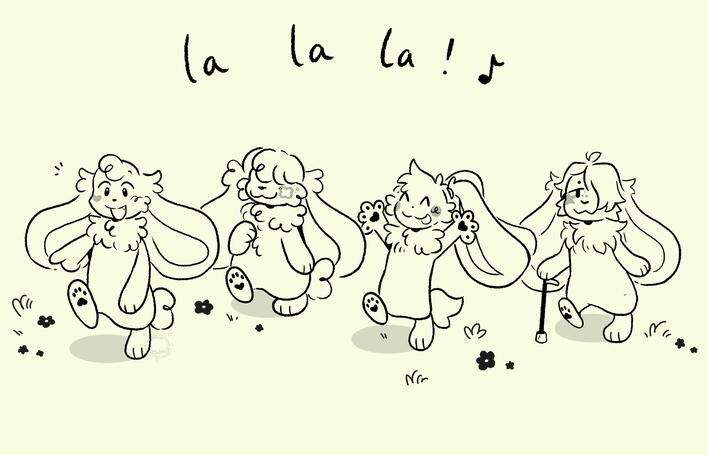Flutterbunnies
An open species by solarpawbs !
Flutterbunnies are a playful and energetic open species, resembling small bunnies and having powers like forest fairies. With lots of love to give and their desire to make others happy, flutterbunnies try their hardest to bring smiles to peoples’ faces whenever and however they can!
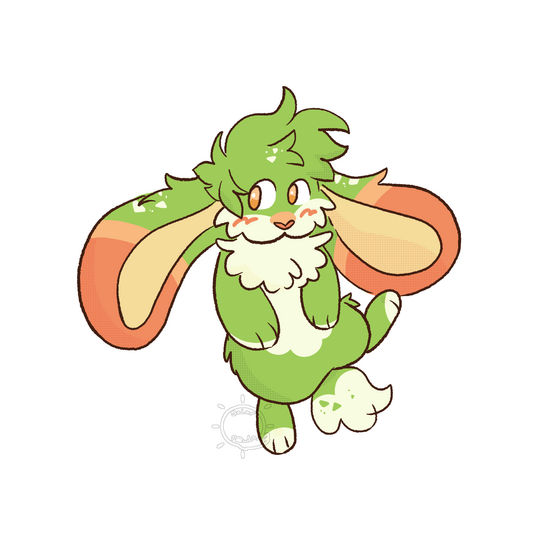
Biology
Anatomy
Flutterbunnies are sizeshifting, bunny-adjascent creatures! These little guys' sizes usually default to 5-9 inches, usually depending on age, health and genetics. However, they also posses the ability to change their size at will! With enough practice, the variability of their size will change, some even getting good enough to be as big as a skyscraper! Different flutterbunnies will have different preferences in what height they like to maintain for different reasons. Sometimes when spooked, however, these buns will poof back to their default size.Although they look most similar to bunnies, there are a couple of things that can make it easier to identify them as flutterbunnies, such as...• Long plush ears that go down to (or anywhere past) their hips. They usually hang in a way that starts from the sides of their heads but appears facing forwards, however their ears do change position to have the fronts of them facing their sides whenever they fly.
• A large fluffy mane that goes around their neck and reaches down to the end of their chests (they can vary in size and volume! Some flutterbunnies may choose to trim their manes shorter, however.)
• Large paws with paw pads and retractable claws
• Big nub-tails to help them balance the weight of their ears
• Small, visible “fangs”/canines
• A more triangular or heart shaped noseFutterbunnies come in all shapes and sizes just like everyone else!
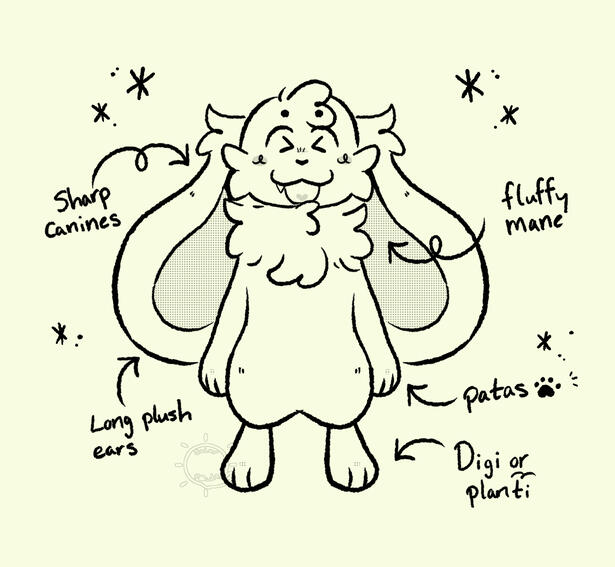
Flutterbunnies are always born with one or two distinct markings on their cheeks! These markings can vary in complexity, from a simple spot to a full-blown miniature artwork! Sometimes these markings end up identical to each other, while other times they end up looking differently. The possibilities are endless!
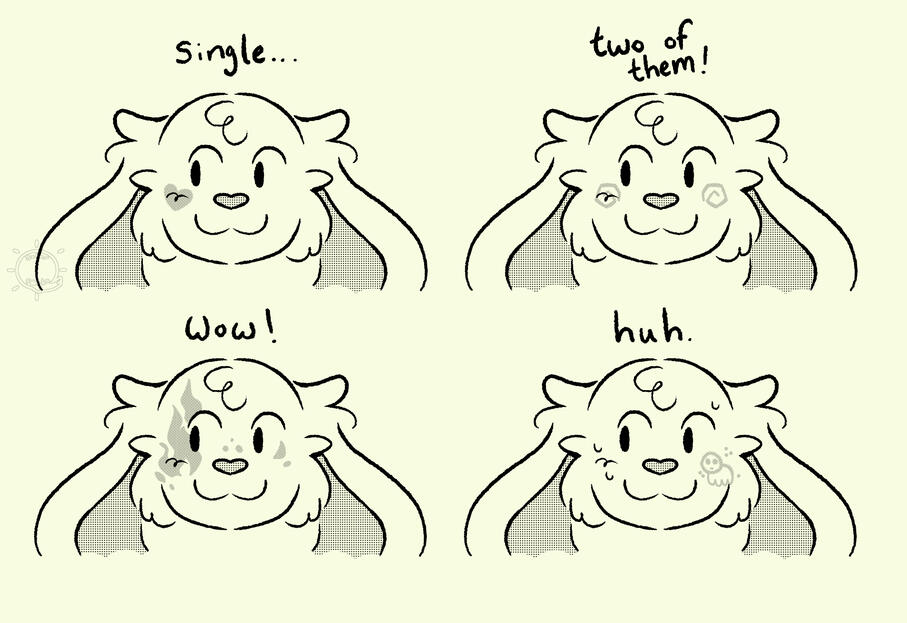
Eggs and Kittchicks
Unlike most mammals, flutterbunny babies hatch from unique coloured and patterned eggs about the size of a robin's egg. After roughly 40 days, the eggs hatch into smaller and much fluffier versions of what the adults look like. Although they mostly travel on all fours for the majority of their toddler years, most transition to becoming bipedal by the age of 8. It is around this time as well that their adult fur comes in and their markings become clearer.
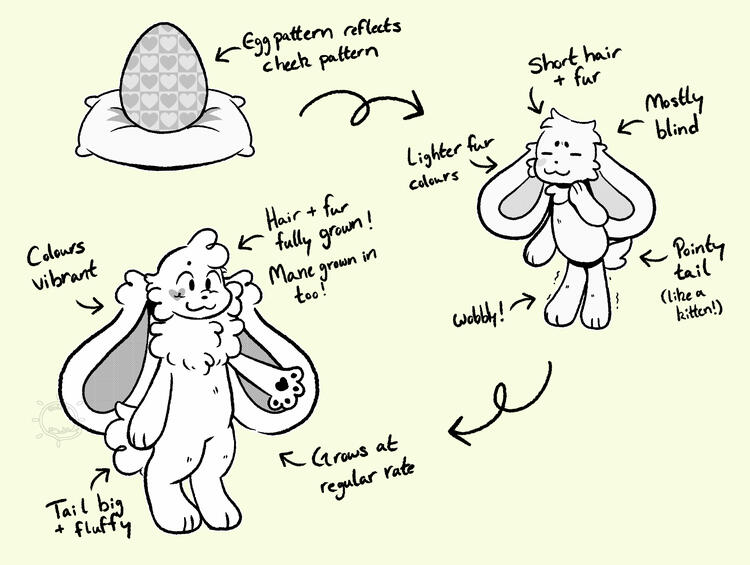
Diet
Flutterbunnies’ are omnivores, so their diets typically consist of fruits, vegetables, nuts, seeds, and small insects. Because of the average flutterbunnies’ size, even one fruit from any of their many fruit trees or berry bushes in their farms is enough to make a whole day’s meal complete. They also enjoy the sweet nectar from flowers, although this is mostly like special desserts to them. Brightly coloured flowers always seem to be a favourite of theirs!
Behavior & Society
Sounds
Flutterbunnies make many chirping and tweeting sounds, sounding very close to happy guinea pigs. When extremely excited, they may even begin to sound like songbirds as they chirp to show their appreciation and joy. On the other end of the spectrum, when angry, a flutterbunny’s chirps become higher pitched to the point where their squeaks begin to sound like dog toys.
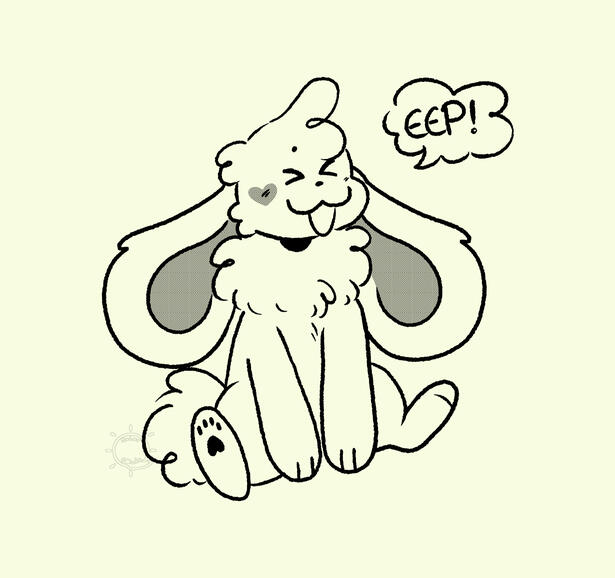
Flying
Flutterbunnies, as the name would imply, have the unique ability to fly through the air like birds. Despite looking similar to mammals known for living on the ground, by flapping their ears, the wind force they create beneath them is enough to lift them up off the ground. Because of their lightweight physiques, there’s never really any sort of strain on them when flying for long periods of time. As they fly, their stomachs sit at an angle facing downwards so the inner area of their ears are pointing to the ground. Flutterbunnies of course will also have moments where hovering is just as necessary, so it is also possible for them to position themselves so they’re able to fly while their stomachs are facing forwards.While the exact reason for this evolution to fly is still unknown, some theorize it to be so they can get closer to the sun. Like plants, flutterbunnies require a lot of time in the sun to give themselves the energy to live happy and healthy lives.
Note: Nothing below needs to be included in your flutterbunny OC’s lore! It’s mostly just for fun :))
Campsites
Flutterbunnies are quite reclusive, so when looking for living spaces, they’ll gather into groups to build large hidden villages people call campsites, seeing as they resemble miniature versions of camping grounds. These campsites can actually grow to be quite big depending on the number of flutterbunnies living there, and yet, they manage to keep them hidden from society with a combination of cloaking charms and skill to camouflage their houses to look like logs, trees, and birdhouses. These campsites’ homes and buildings are always made with organic materials such as stone and wood with lush vegetation and sweet-smelling flowers riddled throughout them.The society within their camps works a lot differently than our own. Because they live without any real sort of ruler, they live by the philosophy that if they can do something to help others, then to do it just for that reason alone. With the absence of money, every flutterbunny is able to eat a healthy amount every day without any flutterbunny ever having to worry about going hungry. Their farms don’t contain any animals, but do have large garden snails which they ride sort of like tractors to help them maintain the areas of their farms where there might be weeds for the snails to eat. They also have wells scattered around the farms to supply an easy resource for water in a way that keeps them from having to get wet. The farms will often also include large orchards of fruit bushes and huge vegetable farms.
Winter
Flutterbunnies have a seasonal sleepy period that comes every winter, starting every year on the first day of December. During autumn, they eat a lot of extra meals and food to gain a couple extra pounds to stay warm for the winter. Their fur length changes to match the winter season, making sure they stay warm and cozy while the snow falls.On the first day of spring, they get back to their usual routine! This first day of waking up is usually very busy for them, seeing as they would’ve missed a whole 3 months of maintaining their homes’ usual tidiness. Because of this, they’re sure to work extra hard and even sometimes hold celebrations to appreciate their hard work.
Guidelines
DO
• Make your own flutterbunnies to keep, trade, sell, etc! F2U base here!
• Feel free to make suggestive character art
• Give your flutterbunny a fun backstory
• Let your flutterbunny have any body type
• Make hybrids of flutterbunnies with other animals (ex: flutterbunny/cat hybrid)
• Make + sell NSFW character art
DON'T
• Make/convert to/mint as NFTs
• Use flutterbunnies/flutterbunny art to train AI models
• Go too far outside the species perimeters
• Claim species as your own
• Post NSFW character art
If you have any questions at all, feel free to DM me on my Twitter, Instagram, Tumblr, or on my Bluesky all under the username “solarpawbs”!
